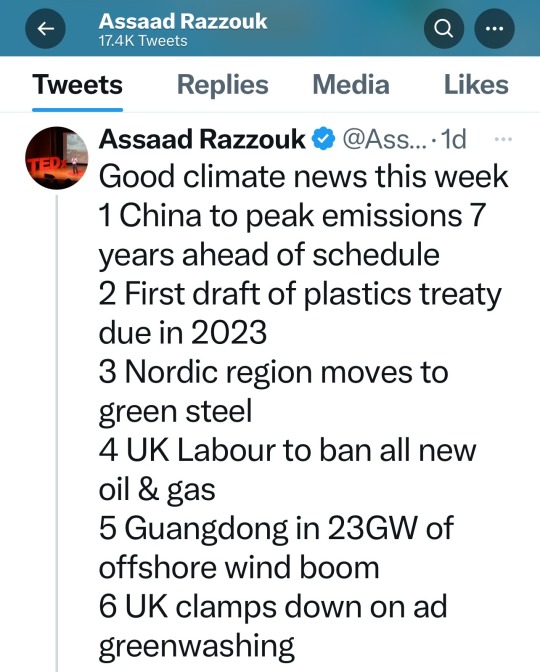#assaad razzouk
Text
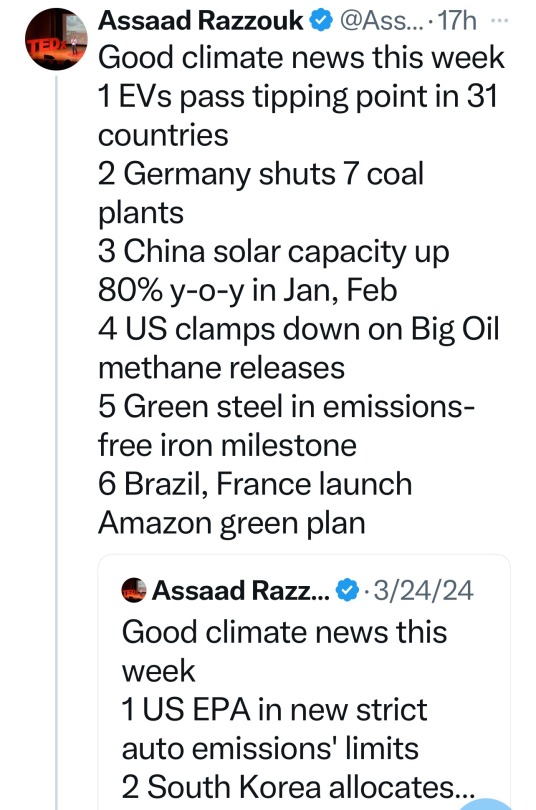
2 notes
·
View notes
Text
Why you should stop agonizing about mining associated with EVs and other clean energy
We need to put the impacts of the energy transition into perspective, comparing to what it is replacing. According to Assaad Razzouk, fossil fuels …Why you should stop agonizing about mining associated with EVs and other clean energy
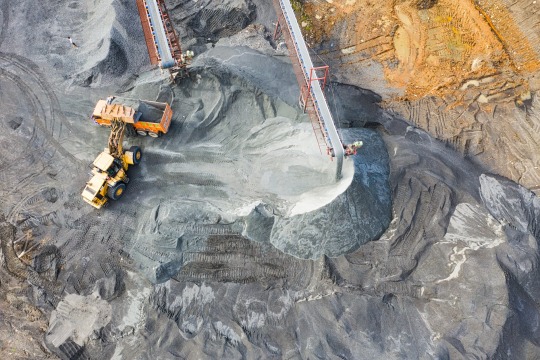
View On WordPress
0 notes
Text
youtube
Watch the 2024 American Climate Leadership Awards for High School Students now: https://youtu.be/5C-bb9PoRLc
The recording is now available on ecoAmerica's YouTube channel for viewers to be inspired by student climate leaders! Join Aishah-Nyeta Brown & Jerome Foster II and be inspired by student climate leaders as we recognize the High School Student finalists. Watch now to find out which student received the $25,000 grand prize and top recognition!
#ACLA24#ACLA24HighSchoolStudents#youtube#youtube video#climate leaders#climate solutions#climate action#climate and environment#climate#climate change#climate and health#climate blog#climate justice#climate news#weather and climate#environmental news#environment#environmental awareness#environment and health#environmental#environmental issues#environmental education#environmental justice#environmental protection#environmental health#high school students#high school#youth#youth of america#school
14K notes
·
View notes
Link
0 notes
Text
A tweet
Wildlife Armageddon: New figures released by the University of Sydney indicate more than 800 million animals have been killed in the state of New South Wales alone, while more than 1 billion died nationally
1 billion
1 billion
1 billion
1 billion
1 billion
1 billion pic.twitter.com/Ues12U1Clb
— Assaad Razzouk (@AssaadRazzouk) January 8, 2020
0 notes
Text
RT @AssaadRazzouk: Renewables Rising: US Utility-scale battery storage power capacity more than quadrupled from end of 2014 (214 MW) through March 2019 (899 MW), and is set to quadruple again by 2023 Fossil fuels can’t compete on cost, anywhere. Only politics and money allow them to #climate https://t.co/KtelWfLx0U
Renewables Rising: US Utility-scale battery storage power capacity more than quadrupled from end of 2014 (214 MW) through March 2019 (899 MW), and is set to quadruple again by 2023
Fossil fuels can’t compete on cost, anywhere. Only politics and money allow them to#climate pic.twitter.com/KtelWfLx0U
— Assaad Razzouk (@AssaadRazzouk) July 14, 2019
https://platform.twitter.com/widgets.js
from Twitter
View On WordPress
0 notes
Text
Tweeted
China: Shenzhen's 12 million people are breathing the cleanest air in 20 years after city turned all of its 16,000 buses (more than the bus fleets of New York, LA, Chicago and Toronto combined) and 20,000 taxis to electric ones
Electric vehicles save lives#ActOnClimate pic.twitter.com/u5A9emoBnL
— Assaad Razzouk (@AssaadRazzouk) April 3, 2019
0 notes
Text
youtube
Watch the American Climate Leadership Awards 2024 now: https://youtu.be/bWiW4Rp8vF0?feature=shared
The American Climate Leadership Awards 2024 broadcast recording is now available on ecoAmerica's YouTube channel for viewers to be inspired by active climate leaders. Watch to find out which finalist received the $50,000 grand prize! Hosted by Vanessa Hauc and featuring Bill McKibben and Katharine Hayhoe!
#ACLA24#ACLA24Leaders#youtube#youtube video#climate leaders#climate solutions#climate action#climate and environment#climate#climate change#climate and health#climate blog#climate justice#climate news#weather and climate#environmental news#environment#environmental awareness#environment and health#environmental#environmental issues#environmental justice#environment protection#environmental health#Youtube
14K notes
·
View notes
Text
RT @AssaadRazzouk: This yacht promises up to 100 miles (160km) of cruising per day for weeks at a time on solar power alone - and its electric powertrain is all but maintenance-free https://t.co/Bb6DthTBnq #climate #tech https://t.co/DpcfHV2MLG
This yacht promises up to 100 miles (160km) of cruising per day for weeks at a time on solar power alone - and its electric powertrain is all but maintenance-freehttps://t.co/Bb6DthTBnq #climate #tech pic.twitter.com/DpcfHV2MLG
— Assaad Razzouk (@AssaadRazzouk) December 22, 2018
from Twitter https://twitter.com/SKSMedia
0 notes
Text
Tweeted
The world on fire: New July 2018 temperature records
UAE: 51.4°C
Africa + Algeria: 51.3°C
Tunisia: 49.2°C
LA: 48.9°C
Baku: 42.7°C
Yerevan : 42.4°C
Japan: 41.1°C
Kabul: 40.5°C
Tbilisi: 40.5°C
Montreal: 36.6°C
Lapland: 33.4°C
Swedish polar circle: 32.5°C
Baltic Sea: 25°C#climate pic.twitter.com/J719agZCr5
— Assaad Razzouk (@AssaadRazzouk) July 26, 2018
0 notes
Text
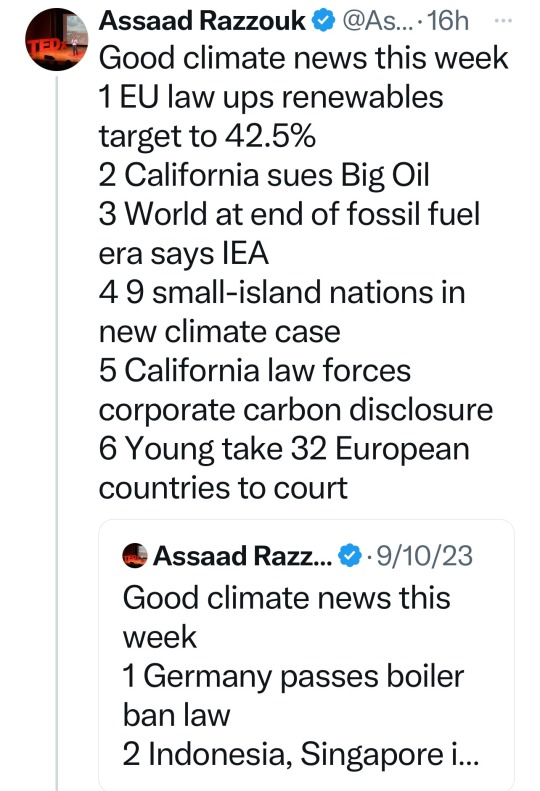
4 notes
·
View notes
Text
How we fund a fast transition to clean energy
The world knows we need to transition to clean energy, but there’s a lot of hand-wringing about how we’ll pay for it. Assaad Razzouk takes …How we fund a fast transition to clean energy

View On WordPress
0 notes
Text
Expert: What will it take for society to make the deep-rooted changes required to prevent the terrifying and awesome threat of climate breakdown? This summer’s extreme weather events are simply a prelude to a rising tide of chaos that will be punctuated by cataclysmic individual events – floods, heatwaves, superstorms – of increasing severity and frequency. How long before people demand radical action from governments? Or, and this is what is really needed, how long until citizens remove corporate-captured governments from power and introduce genuine democracy? Consider just some examples of this summer’s extreme weather. In Japan, ferocious heat killed more than 80 people and flooding killed more than 200. In Greece, 80 people died in terrible wildfires. In Canada, a heatwave killed more than 70. In many places around the world, including northern Europe, central America, Russia and parts of the US, extreme drought has put harvests at risk. Across the globe, 118 all-time records were broken or tied. In the United Arab Emirates, a record temperature in excess of 51C was recorded, Montreal broke 36C, the Baltic Sea reached 25C and the Swedish polar circle saw temperatures in excess of 32C. The Russian Arctic experienced ‘anomalously high temperatures’ more than 20C warmer than usual. And on and on. To his credit, BBC News North America correspondent James Cook gave a sense of the scale of the climate disasters that were unfolding, with the reported death toll in Greece still rising: ‘Climate change. It’s here. It’s catastrophic. This month alone: — “50 dead” in Greece wildfires — Arctic Circle ablaze — Japan heatwave, flooding and landslides kill hundreds — Record temperatures in Algeria, Morocco, Oman — Drought squeezes US lemons’ Under the heading, ‘The world on fire’, Assaad Razzouk, a commentator on climate and clean energy, also tweeted a disturbing set of numbers: ‘New July 2018 temperature records UAE: 51.4°C Africa + Algeria: 51.3°C Tunisia: 49.2°C LA: 48.9°C Baku: 42.7°C Yerevan : 42.4°C Japan: 41.1°C Kabul: 40.5°C Tbilisi: 40.5°C Montreal: 36.6°C Lapland: 33.4°C Swedish polar circle: 32.5°C Baltic Sea: 25°C’ Scientists report that the ‘signal of climate change is unambiguous’ in these extreme phenomena. In Europe, climate change driven by humans has made such events more than twice as likely to occur, and possibly as much as five times more likely. By the 2040s, heatwaves even worse than this summer’s will likely occur every other year, if not more often. This will lead to a tripling of annual heat-related deaths in the UK to 7,000. MPs say that the country is ‘woefully unprepared’ for such deadly heatwaves, with ‘the government ignoring warnings from its official climate change adviser.’ Andrew King and Ben Henley noted in an article on The Conversation website: The world has so far had around 1℃ of global warming above pre-industrial levels, but at the global warming limits proposed in the Paris climate agreement, hot summers like that of 2003 in central Europe would be a common occurrence. At 2℃ of global warming, the higher of the two Paris targets, 2003-like hot summers would very likely happen in most years. Similarly, we know that heat exposure and heat-induced deaths in Europe will increase with global warming, even if we can limit this warming to the levels agreed in Paris. Climate scientists have ample evidence that human-driven global warming is already ‘making heat waves longer, hotter and more frequent’. Corinne Le Quéré, director of the Tyndall Centre for Climate Change Research at the University of East Anglia, describes the evidence as ‘really compelling’. Michael Mann, one of the world’s leading climate scientists, says that: The impacts of climate change are no longer subtle. We are seeing them play out in real time and what is happening this summer is a perfect example of that. He added: We are seeing our predictions come true. As a scientist that is reassuring, but as a citizen of planet Earth, it is very distressing to see that as it means we have not taken the necessary action. ‘The Climate Change Monkeys are in Full Voice’ How have the media been responding to the ‘very distressing’ reality that humanity has not taken the ‘necessary action’ to avoid climate breakdown? Some of the usual fringe voices lurking beyond the realms of rationality, yet still enjoying high-profile media platforms, issued standard denunciations of reality. For instance, in a Mail piece about ‘hysterical doom merchants’, Quentin Letts gave the UK Met Office a piece of his mind: The Met Office, once a level-headed analyst of barographs and incoming weather fronts, issued bubonic plague-style warnings that we should not step outside in this heat and should not open our windows. The commentator sighed: Whatever happened to Keep Calm and Carry On? In the Sun, Rod Liddle scoffed that ‘the authorities’ have declared that ‘nice summers are a crisis’, adding: those tiresome drongos at the Met Office put out an amber alert when the temperature rose this week. “Don’t go out! Stay in your homes! Or you will die — DIE, I tell you.” Oh, with the greatest respect — f*** off! Liddle bemoaned that: the climate change monkeys are in full voice. In short: The Met Office can stick advice where sun doesn’t shine — let us enjoy the heat while it lasts. In slightly less intemperate language, but still rejecting the huge weight of scientific evidence, longtime climate ‘sceptic’ Christopher Booker declared: Yes it’s scorching, but claims that the heatwave is down to climate change are just hot air: June was even hotter when Victoria was on the throne. He went on: ‘this kind of summer heat is far from unprecedented. In fact, as people have begun to observe, the nearest parallel to what has been happening this year was the celebrated “drought summer” of 1976.’ In fact, the comparison to 1976 is deeply misleading, as a viral tweet from Simon Lee, a meteorology PhD student at the University of Reading, brilliantly made clear: The big difference between the heatwaves of 1976 and 2018. June 1976: the UK was one of the warmest places relative to normal across the globe, with most areas cooler than average. June 2018: the UK was just another warm blob in a mostly warmer than normal world. #GlobalHeatwave. So much for Booker’s science-denying diatribe and the other media extremists still trying to dodge climate reality and promote climate fiction. As Carbon Brief editor Leo Rickman pointed out: As temperatures in the UK near record levels, MPs warn today that heatwave deaths could triple by 2050. So what do the editors of the Daily Mail and the Sun do? Order their writers to aggressively attack climate scientists… Staring in “Open Mouthed Disbelief” at the News But what was the media response in more ‘respectable’ quarters, particularly the BBC? Media Lens does not have the huge resources required to monitor all BBC News coverage across television, radio and the internet. But observations suggested strongly that, although the link with climate wasn’t entirely ignored, the bulk of the broadcaster’s coverage of global weather extremes gave it short shrift. Citing Simon Lee’s comparison of the 1976 and 2018 heatwaves, Emma Pinchbeck, an executive in the renewable energy industry, tweeted the BBC: More reasons that climate change should be getting a mention in your drought coverage .@BBCr4today @BBCBreakfast (sorry if this repeated exasperation is getting… exasperating… but honestly I start every day in open-mouthed disbelief at the news) For some time during the day on July 24, BBC News website actually had three of its top six stories about weather extremes, but with no substantive discussion of the link to human-driven climate instability. Even mild exceptions to the rule stood out, such as when BBC science correspondent David Shukman spoke briefly about the role of global warming: We can never say that a particular weather event like this heatwave is just because of global warming. What you can say, that the science allows you to say, is that the world is warming, that makes certain things more likely. While welcome, this was the most conservative expression of scientific caution – typical of the BBC. Compare with the kind of urgent and impassioned comment seen above from Michael Mann: that ‘it is very distressing to see’ this summer’s weather extremes ‘as it means we have not taken the necessary action’. Also in a low-key, cautious vein there was a pre-filmed Newsnight segment, ‘Heatwave 2018 explained’, on July 24 featuring climate scientist Joanna Haigh of Imperial College, London. She told BBC reporter David Grossman: The sort of temperatures that are occurring now would’ve been a 1 in 1,000 occurrence in the 1950s & now they’re about a 1 in 10 occurrence. This was a rather dry statistic; but perhaps it served as a preamble to the requisite urgency that was still to be addressed? The opportunity came in a follow-up, live studio interview conducted by Newsnight presenter Emily Maitlis with two more climate experts: Stephen Belcher, the chief scientist at the Met Office, and Chris Hope, a climate change policy researcher at Cambridge University. But, once again, they made rather careful statements that did not stray far into territory in which urgent and radical action would be made crystal-clear. Scientific rigour is, of course, necessary. But, given the stakes of what is involved, academics now need to speak out forcibly and repeatedly against ‘business-as-usual’ and for sane alternatives. Kevin Anderson, a Manchester-based professor of energy and climate change, is a much-needed outspoken example. He tweeted recently: How far will we go to justify our lies – Heathrow expansion, shale gas & more roads are all good for the climate. Fortunately the uproar from our vibrant & ethically robust academic community will soon draw attention to such aberrant nonsense – or will it be a compliant whimper? All too often it is indeed just a compliant whimper. Consider, by contrast, the warning from leading climate scientist James Hansen: There’s a misconception that we’ve begun to address the climate problem. The misapprehension is based on the Paris climate summit where all the government leaders clapped each other on the back as if some great progress has been made, but you look at the science and it doesn’t compute. We are not doing what is needed.’ In an interview, Hansen was even more blunt, describing the Paris climate summit as ‘a fraud’: It’s just bullshit for them [government leaders] to say: “We’ll have a 2C warming target and then try to do a little better every five years.” It’s just worthless words. There is no action, just promises. As long as fossil fuels appear to be the cheapest fuels out there, they will be continued to be burned. More climate scientists need to speak out in this way. The time for remote detachment from the urgent need for societal and political action, out of a misplaced fear of being perceived as a biased activist academic, is long gone. Being fully human, and expressing valid criticism of government policy and priorities, does not negate one’s capacity to be a rigorous researcher. At least this particular edition of Newsnight showed that one thing had improved in BBC climate discussion, however. Ten years ago, as Leo Hickman observed, one of the two interviewees would likely have been an extremist climate ‘sceptic’ like Nigel Lawson to maintain the BBC’s notion of ‘balance’. However, Newsnight shot itself in the foot when it later gave a misleading account via Twitter of what the Met Office’s Stephen Belcher had actually said in the discussion. Newsnight tweeted the first part of his essential message: The heatwave that we’ve got is probably part of natural cycles in the weather. This made it sound as though human-driven global warming probably plays no part in current weather extremes. But his full remark was actually: The heatwave that we’ve got is probably part of natural cycles in the weather but it’s superimposed on this background of global warming, and that’s what’s elevating our temperatures. In other words, anthropogenic climate change is behind the heatwave. Newsnight later corrected its ludicrous error. What about press coverage? Using the ProQuest newspaper database, we found the following search results on July 31 for UK newspaper articles since June 22 (i.e. around the date the heatwave began): ‘heatwave’: a total of 3101 results ‘heatwave’ + ‘climate change’: 255 results. 8% of the total ‘heatwave’ + ‘global warming’: 95 results. 3% ‘heatwave’ + ’emissions’: 89 results. http://clubof.info/
0 notes
Quote
California wildfires fueled by record warm summer worsen:- 40 dead- Fires 100 miles wide- 5,700 homes gonehttps://t.co/164WcDIkrD http://pic.twitter.com/5Agb8KdUtA— Assaad Razzouk (@AssaadRazzouk) October 15, 2017
http://twitter.com/AdamGrandt
0 notes
Text
Tweeted
Output of An Offshore Wind Turbine Doubled Over 7 Times to 8MW Since 1981, Will Double Again to 15MW By 2025 - As Costs Crash http://pic.twitter.com/TLgtDNPsyV
— Assaad Razzouk (@AssaadRazzouk) May 23, 2017
0 notes
Photo

Assaad Razzouk on Twitter: "Something Not Natural Is Going On In Australia: -Hottest Place On Earth Saturday -Heat Records Outnumber Cold Ones 12 to 1 Over Past Decade https://t.co/WvneI9Sc9c" http://dlvr.it/NNxVG7 #CorpGov
0 notes
Photo
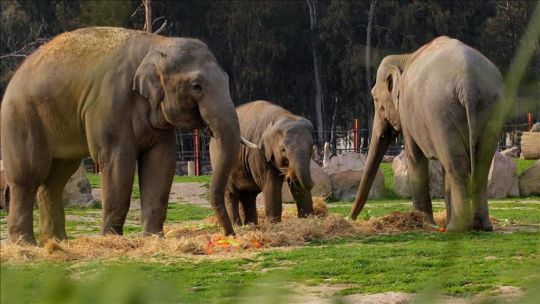
RT @AssaadRazzouk: Myanmar Stepping Up Efforts to Protect its Elephants Following Dramatic Rise In Poaching http://ift.tt/2jXeiBf https://t.co/Tv4tiuxgVx 2PLAN22 http://twitter.com/2PLAN22/status/824808127681925122
Myanmar Stepping Up Efforts to Protect its Elephants Following Dramatic Rise In Poachinghttps://t.co/9RGbpg0V9S #wildlife #conservation http://pic.twitter.com/YvY3CaeWZg
— Assaad Razzouk (@AssaadRazzouk) January 27, 2017
0 notes
